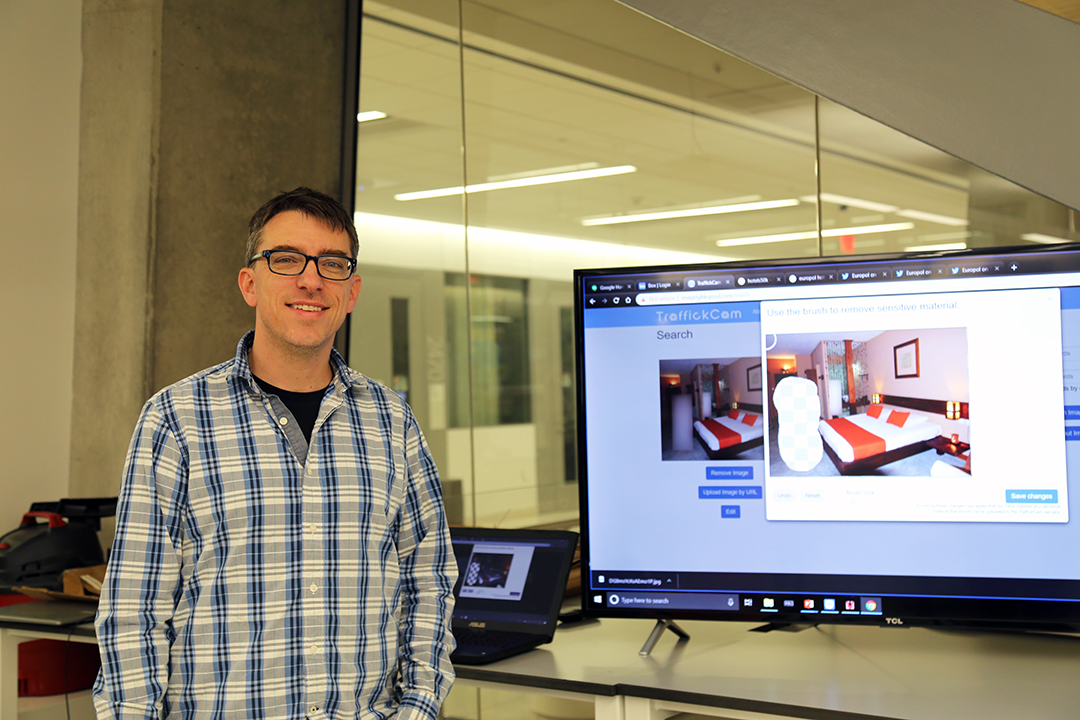By Tatyana Hopkins
A crowd packed into Marvin Center’s Betts Theatre, Thursday, to hear two GW Law advocacy teams argue a fictitious Supreme Court case before a panel of U.S. Court of Appeals judges in the final round of the Van Vleck Constitutional Law Moot Court Competition.
The all-female finalist teams argued before a bench including federal Judges John Bush and Joan Larsen of the 6th U.S. Circuit Court of Appeals and Gregory Katsas of the D.C. Circuit.
This was only the fourth time in the competition’s 69-year history that all four finalists were female.
This year’s argument focused on two legal issues drafted by competition vice-chairs and student authors Tazia Statucki and Madeline Smedley. The case addressed the constitutionality of a hypothetical federal statute seeking to regulate and criminalize revenge pornography, which is the distribution of messages, images or videos of a subject that is nude or engaging in sexual acts without the subject’s consent.
The mock petitioner, Lito Rodriguez, attempted to overturn a conviction under the statute in the U.S. Supreme Court after pleading guilty to charges related to sharing intimate photos and videos of his ex-fiancé, Jay Komos, online after they broke off their engagement. The respondent, the United States of America, attempted to uphold the conviction previously affirmed by two lower courts.
The four competitors—third-year law students Stephanie Hansen and Julie Sweeney for the petitioner and second-year law students Natalie Goldberg and Anastasia Hautanen for the respondent—argued and analyzed two separate issues: whether Congress had the authority to enact such a statute and whether the statute infringed on the First Amendment right to freedom of speech. The four students faced multiple questions from the panel of judges.
Prior to announcing the final decision, the judges shared oral advocacy tips with the students such as truncating their points to “what the [judges] are trying to get out of the argument” and making sure to refer back to opposing counsel while making affirmative points for their position.

From left to right: Stephanie Hansen, Julie Sweeney, Gregory Katsas, John Bush, Joan Larsen, Natalie Goldberg and Anastasia Hautenen.
“I thought you all handled our questions well,” said Mr. Bush, who played the role of chief justice. “I didn’t sense that anyone really got flustered on anything. You seemed to be prepared for what we were throwing at you.”
Ms. Larsen commended the students for remaining “poised” after being “hammered” with questions during their arguments and said they all had “bright” futures in oral advocacy.
“You are all very skilled advocates and way above the median of what I saw in the Michigan Supreme Court or what I see in the 6th Circuit,” she said, “and those are people with lots of experience and have clients paying them lots of money.”
Mr. Katsas agreed. He said the finalists’ performances would put them in the "top 2 to 5 percent" of practicing lawyers that argue before him in the D.C. Circuit.
“We sensed you were listening to the questions and engaging us,” Mr. Katsas said. “Obviously, we were trying to press the weak sides of each case, and you gave us what were almost always the best answers to tough questions and then tried to circle back to more affirmative points.”
The Van Vleck competition is the law school’s largest and longest-running advocacy competition. It is named for the school’s longest-serving dean, William C. Van Vleck. The competition’s aim is to provide students with the opportunity to hone their oral and written advocacy skills by engaging in mock appellate litigation.
The final was the culmination of six rounds that began in September with 60 students, where each team of two competitors was required to submit a written brief and present oral arguments for each side.
Each year the winning team receives the Jacob Burns Award during a ceremony the day before Commencement.
In a split decision, the judges voted 2-1 in favor of the petitioner for the best overall team.
Additionally, Ms. Goldberg was selected as the best oral advocate for the entire competition.
“It was a terribly close call today,” Mr. Bush said. “So, you can all consider yourselves to be winners of this competition.”




